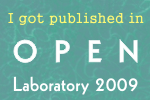Four years ago I wrote about how Open Access would be adopted if it were convenient. Polls at the time showed that few scientists actively seek to publish OA, even though many support it. Reasons given, in no particular order: aiming for journals that were not OA and high publication fees. My conclusion was that researchers […]
(With apologies to the memory of Elizabeth Barrett Browning) How shall I license thee? Let me count the ways I license thee to be free to distribute and embed My code can be buggy, when I wrote it late last night “While” loops have been made without a stated end I license thee to change […]
TL; DR: The genome sequence of the North American Wood Frog will tell us a lot about the genetic control of freezing and reanimating whole organisms. My friend and colleague, Dr. Andor Kiss is crowdfunding this project. If you would like to help, please go to experiment.com. You will get acknowledged by name in the paper. To […]
Fakeference invitation: an email from Nancy, Sally or June, inviting you, for the second time (“perhaps you didn’t get my first invitation, there may be something wrong with my email”) to speak at a conference. The meeting has 5-10 Nobel laureates listed as invited speakers, and covers everything in science, from quantum mechanics to fish breeding. […]
Or: “Estimating how much we don’t know, and how much it can hurt us”. This post is about a paper I published recently with Predrag Radivojac’s group at Indiana University, who lead the study. One of the main activities I’m involved with is CAFA,* the critical assessment of function annotations. The general idea of CAFA […]
I recently received an email from PLoS-ONE summarizing my editorial activity for the first half of 2014. That’s a good thing: for one, I’m terrible at keeping track of all my service activities, and this helps in keeping them straight for my own annual activities report for my university. Second, I can see how I […]
Mozilla Science Labs are looking top pair programmers and scientists. If you are a scientist in need of a programmer, read the following, and then go to the website to see how to take it further. Thanks to Miami University’s Office for Advancement of Research and Scholarship for bringing this to my attention. Interdisciplinary Programming is […]
So things have been busy in non-blog land. Putting together a tenure packet, some travel, teaching, and oh yes, even science. So no insightful post here, just some odds and ends I collected, in no particular order: There are quite a few species named after famous people: alive, dead, real or fictional. Wikipedia has a […]
What makes a nerd a nerd? The stereotype is that of someone with a high intelligence, coupled with social awkwardness and a wardrobe that may alert the fashion police. Now scientists think they may found the genomic links to these traits. There was always a strong suspicion of a genetic component in people that are […]
This came up in my inbox. An interesting and welcome initiative, making thousands of ALS patients’ medical data available for analysis. It doesn’t seem to have any sequence data (so not a bioinformatic database), but there are heaps of biomedical data in which to sink your statistical teeth. Dear All, My name is Hagit Alon […]
I recently applied for a Moore Foundation grant in Data Science for the biological sciences. As part of the pre-application, I was asked to choose the top 5 works in data science in my field. Not so sure about data science, so I picked what I think are the most influential works in Bioinformatics, which […]
Found this on Reddit r/machinelearning (In related news, there’s a machine learning subreddit. Wow.) Support Vector Machines (warning: Wikipedia dense article alert in previous link!) are learning models used for classification: which individuals in a population belong where? So… how do SVM and the mysterious “kernel” work? The user curious_thoughts asked for an explanation of […]
Wow, I haven’t posted anything in quite a while. Things are busy outside blogoland. But committing this blog to the February edition of the Carnival of Evolution just made me do it, so here goes. We’ll do this by scales, bottom up. Molecular Prions are the infective agents that cause transmissible spongiform encephalopathies such as […]
Got this from a tweet by Casey Bergman
(From Peter Cock, via the OBF News Blog) We’re pleased to officially confirm that one of the two keynote speakers for the 15th annual Bioinformatics Open Source Conference (BOSC 2014) will be C. Titus Brown, as he announced on Twitter recently: Titus Brown (@ctitusbrown): Excited to be a keynote speaker at BOSC 2014! My […]





